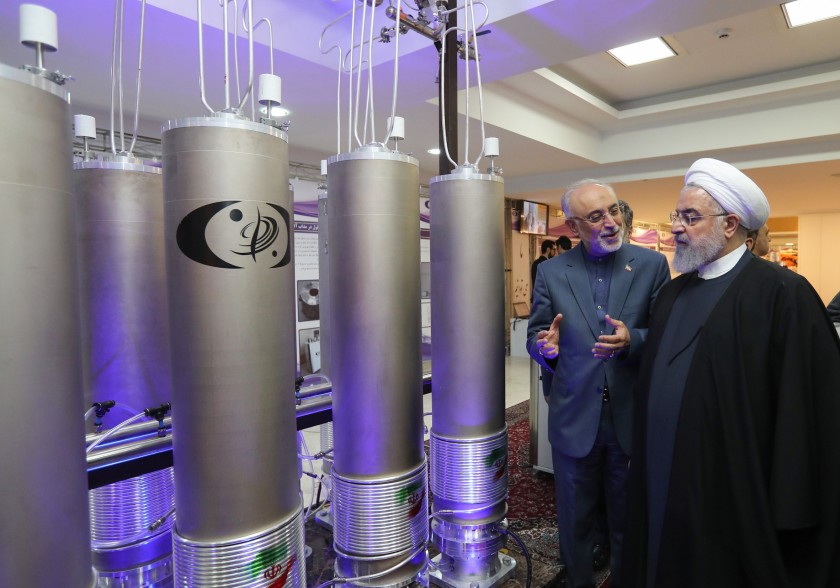IN THE MEDIA
Time to push for new Iran nuclear deal
January 10, 2020 | Ahron Shapiro

An edited version of this article appeared in The Age and Sydney Morning Herald on Jan. 10, 2020.
Amidst the high stakes drama that is currently playing out between Iran and the US in Iraq, it’s easy to lose sight of the main issue fueling the tension, that is, the pressing need to prevent Iran from building nuclear weapons.
Former deputy director-general for safeguards at the International Atomic Energy Agency Olli Heinonen has now raised the alarm, warning Iran could be on a fast track to nuclear breakout – accumulating enough highly enriched uranium to assemble a bomb – within weeks.
Heinonen told the Jerusalem Post, that “If the recent performance numbers, average enrichment levels, and current inventories quoted by [Iran Atomic Energy Organization Director Ali Akbar] Salehi hold, the breakout time by the end of January will be around two months.”
Whether Iran will pursue enriching uranium to 20% is the question which will have the greatest impact on its breakout time, since attaining this level of enrichment actually means 90% of the work has been done to reach the weapons-grade uranium enrichment levels of 90%.
The speed at which Iran has been able to undo the restrictions on its nuclear program agreed to in the 2015 Joint Comprehensive Plan of Action (JCPOA) nuclear deal illustrates the inherent flaws of that agreement. Recent intelligence revelations by Israel from a Teheran-based nuclear archive seized showed that, even before the US pulled out of the deal in May 2018, Iran was violating it in numerous ways – and since May 2019, Iran has taken a series of steps which openly violate almost all of its key restrictions.
In violation of the nuclear deal, Iran maintained undeclared nuclear sites, including a secret trove of nuclear weapon plans and research. In addition, these files later exposed the existence of an undeclared nuclear development site at Abadeh.
According to numerous reports issued by German intelligence agencies over the past two years, Iran continues to be involved in efforts to procure technologies and materials that can have relevance in a nuclear weapons program, again, in violation of the deal.
As part of its commitments under the JCPOA, Iran committed to render its Arak heavy water reactor, designed to produce plutonium, inoperable by pouring cement into its core. Instead, Iranian officials now say they merely plugged easily replaceable piping surrounding the core. Last month, it activated the reactor’s secondary circuit, bringing it closer to resuming full activity and producing material that could be used for a plutonium bomb.
The JCPOA was profoundly flawed because the inspections regime was insufficiently watertight, it enabled Iran to continue to develop ballistic missiles, enrich uranium, and work on advanced centrifuges. Moreover, it always appeared very likely that Iran would be able to build nuclear weapons once the 10-year sunset clauses in the deal expired – which is now only a few years away.
Also, as critics predicted, the massive funds liberated by the deal turbo-charged Iran’s aggressive activities regionally. And so, since the nuclear deal, we have seen Iranian military expansion all over the region, such as: In Syria where its forces, advisors and proxies helped secure the brutal Assad regime in the civil war and establish a growing permanent military presence; in Iraq, where Iran has intimidated and muscled its way into a commanding position over the affairs of that country; in Lebanon, where it’s proxy Hezbollah supported the candidacy of prime minister-designate Hassan Diab, holds the south of the country in its military grip and targets Israel with up to 150,000 rockets; and in Gaza, where it commands the Palestinian Islamic Jihad terror group and holds considerable sway over Hamas.
Iran was only interested in a nuclear deal that could be easily reversed and allow the resumption of nuclear weapons development in short order. This is why it refused to allow the closure of the heavily defended and fortified underground site of Fordo as part of the nuclear deal.
In 2009, US President Barack Obama described Fordo’s “size and configuration” to be “inconsistent with a peaceful program.”
In order to get Iran to agree to the nuclear deal, however, Fordo was allowed to remain open as a “research facility”. The centrifuges remained in place, and in November 2019, literally overnight, Iran resumed enrichment there.
The rapid unravelling of the nuclear deal, seen together with Iran’s increasingly destructive behaviour in the region, tells us all we need to know about Iran’s intentions and about the inadequacy of the original deal.
As US President Donald Trump rightly declared this week, “Iran must abandon its nuclear ambitions and end its support for terrorism.” He added, “The time has come for the United Kingdom, Germany, France, Russia and China to recognize this reality. They must now break away from the remnants of the Iran deal… and we must all work together toward making a deal with Iran that makes the world a safer and more peaceful place.”
With Iran rapidly closing the gap towards nuclear breakout, a diplomatic imperative has arisen for all stakeholders, including Australia, to allow the JCPOA to fade into irrelevance and to set out to increase pressure on Iran to return to the negotiating table. Together they can renegotiate a nuclear deal that ensures a peaceful Iranian future genuinely free from the nuclear brinksmanship and blackmail which is the inevitable result of Iran’s current trajectory, despite and because of the flaws of the JCPOA.
Ahron Shapiro is a Senior Policy Analyst at the Australia/Israel & Jewish Affairs Council (AIJAC).
Tags: Australia, Iran, JCPOA, United States, proliferation





